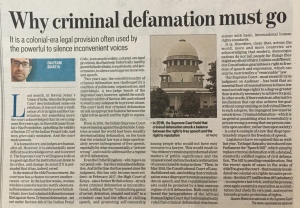Headline:Why criminal defamation must go

Defamation is a false statement that is made by one person about another person and shared with a third party or persons. It is usually a ‘damaging’ statement. According to Black’s Law Dictionary, it is the act of harming the reputation of another by making a false statement to a third person. Defamation can be a crime as well as a civil wrong. Criminal Defamation occurs when one purposely communicates to any person, orally or in writing, any information which he or she knows to be false and knows will tend to expose any other living person to public hatred, contempt or ridicule.
Defamation is criminalised by Sections 499 and 500 of IPC. Section 499 states that “Whoever, by words either spoken or intended to be read, or by signs or by visible representations, makes or publishes any imputation concerning any person intending to harm, or knowing or having reason to believe that such imputation will harm, the reputation of such person, is said, except in the cases hereinafter expected, to defame that person.” This Section also cites its exceptions. These include “imputation of truth” which is required for the “public good” and thus has to be published, on the public conduct of government officials, conduct of any person touching any public question and merits of public performance. Section 500 states the punishment for defamation which shall be simple imprisonment for a term that may extend to two years, or with fine, or both.
Criminal defamation has been in news recently as questions have been raised on whether it should not be criminalised and made a civil offence. Diluting the law of criminal defamation and making it a civil offence would mean monetary damages rather than jail time, if proven guilty.
The constitutional validity of Sections 499 and 500 of IPC has been challenged on the ground of fact that they are violative of the right to freedom of speech and expression guaranteed under Article 19 of the Indian Constitution.
Recently, criminal defamation has emerged as a new system of censorship to silence the inconvenient voices of journalists, writers and activists. SLAPP suits (Strategy Lawsuits against Public Participation) are being increasingly used by large corporations and powerful personalities to frighten and overwhelm critics and opponents.
Section 499 and 500 don’t constitute a “reasonable restriction” on speech, as commented by many, as here even truth is not a defence. If a person has spoken the truth, he can still be prosecuted for defamation. Truth will be a defence only if the statement is made for the public good, which is a question of fact to be assessed by the court of law. Therefore, it deters people from making that they know to be true and hence, hampering their fundamental right of freedom of speech and expression. Further, a magistrate can, under S. 499, issue criminal proceedings against a person on the basis of mere allegations that defendant conspired with the person who actually made the defamatory statement.
Criminal defamation has, thus, become a tool that can be easily invoked and that enables allegedly defamed persons to drag anyone to courts across the country.
However, counter arguments for the same are also available. The principle objective of the law of defamation is to protect the reputation and dignity of the individual against the scurrilous and vicious attacks. Protection of reputation is both a fundamental right as well as human right. According to many, including the Supreme Court of India, Reputation of one can’t be allowed to be crucified at the altar of the other’s right of free speech. Freedom of speech can’t be allowed to erode individual dignity which an integral part of ‘Right to life and liberty’. Defamation law, if diluted, won’t fulfil the purpose as injury to reputation- which covers self-respect, honour and dignity- cannot always be adequately compensated in monetary terms.
For any subject info, please dial 7888-356908